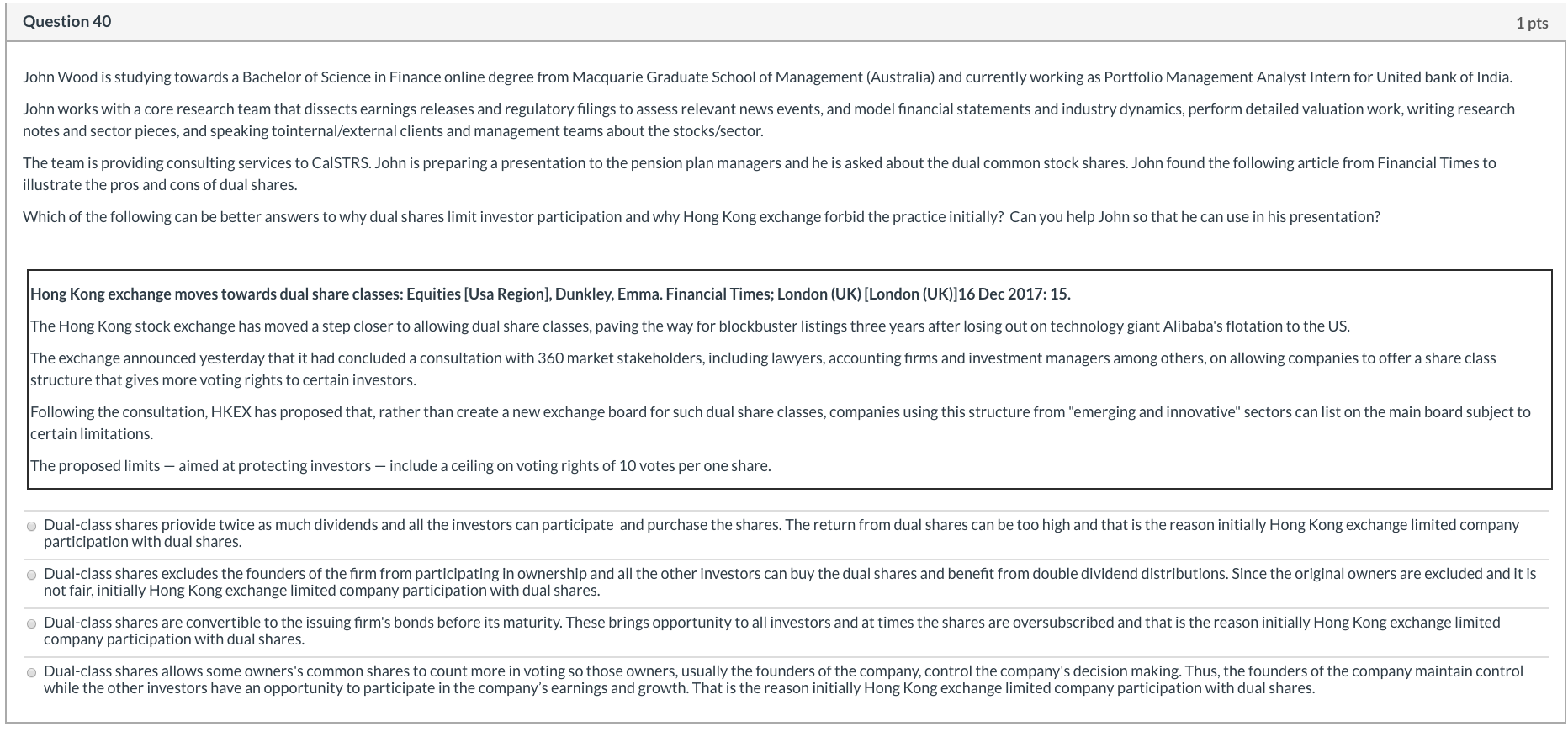
Question 40 1 pts John Wood is studying towards a Bachelor of Science in Finance online degree from Macquarie Graduate School of Management (Australia) and currently working as Portfolio Management Analyst Intern for United bank of India. John works with a core research team that dissects earnings releases and regulatory filings to assess relevant news events, and model financial statements and industry dynamics, perform detailed valuation work, writing research notes and sector pieces, and speaking tointernal/external clients and management teams about the stocks/sector. The team is providing consulting services to CalSTRS. John is preparing a presentation to the pension plan managers and he is asked about the dual common stock shares. John found the following article from Financial Times to illustrate the pros and cons of dual shares. Which of the following can be better answers to why dual shares limit investor participation and why Hong Kong exchange forbid the practice initially? Can you help John so that he can use in his presentation? Hong Kong exchange moves towards dual share classes: Equities [Usa Region), Dunkley, Emma. Financial Times; London (UK) [London (UK)]16 Dec 2017: 15. The Hong Kong stock exchange has moved a step closer to allowing dual share classes, paving the way for blockbuster listings three years after losing out on technology giant Alibaba's flotation to the US. The exchange announced yesterday that it had concluded a consultation with 360 market stakeholders, including lawyers, accounting firms and investment managers among others, on allowing companies to offer a share class structure that gives more voting rights to certain investors. Following the consultation, HKEX has proposed that, rather than create a new exchange board for such dual share classes, companies using this structure from "emerging and innovative" sectors can list on the main board subject to certain limitations. The proposed limits - aimed at protecting investors include a ceiling on voting rights of 10 votes per one share. o Dual-class shares priovide twice as much dividends and all the investors can participate and purchase the shares. The return from dual shares can be too high and that is the reason initially Hong Kong exchange limited company participation with dual shares. Dual-class shares excludes the founders of the firm from participating in ownership and all the other investors can buy the dual shares and benefit from double dividend distributions. Since the original owners are excluded and it is not fair, initially Hong Kong exchange limited company participation with dual shares. Dual-class shares are convertible to the issuing firm's bonds before its maturity. These brings opportunity to all investors and at times the shares are oversubscribed and that is the reason initially Hong Kong exchange limited company participation with dual shares. Dual-class shares allows some owners's common shares to count more in voting so those owners, usually the founders of the company, control the company's decision making. Thus, the founders of the company maintain control while the other investors have an opportunity to participate in the company's earnings and growth. That is the reason initially Hong Kong exchange limited company participation with dual shares. Question 40 1 pts John Wood is studying towards a Bachelor of Science in Finance online degree from Macquarie Graduate School of Management (Australia) and currently working as Portfolio Management Analyst Intern for United bank of India. John works with a core research team that dissects earnings releases and regulatory filings to assess relevant news events, and model financial statements and industry dynamics, perform detailed valuation work, writing research notes and sector pieces, and speaking tointernal/external clients and management teams about the stocks/sector. The team is providing consulting services to CalSTRS. John is preparing a presentation to the pension plan managers and he is asked about the dual common stock shares. John found the following article from Financial Times to illustrate the pros and cons of dual shares. Which of the following can be better answers to why dual shares limit investor participation and why Hong Kong exchange forbid the practice initially? Can you help John so that he can use in his presentation? Hong Kong exchange moves towards dual share classes: Equities [Usa Region), Dunkley, Emma. Financial Times; London (UK) [London (UK)]16 Dec 2017: 15. The Hong Kong stock exchange has moved a step closer to allowing dual share classes, paving the way for blockbuster listings three years after losing out on technology giant Alibaba's flotation to the US. The exchange announced yesterday that it had concluded a consultation with 360 market stakeholders, including lawyers, accounting firms and investment managers among others, on allowing companies to offer a share class structure that gives more voting rights to certain investors. Following the consultation, HKEX has proposed that, rather than create a new exchange board for such dual share classes, companies using this structure from "emerging and innovative" sectors can list on the main board subject to certain limitations. The proposed limits - aimed at protecting investors include a ceiling on voting rights of 10 votes per one share. o Dual-class shares priovide twice as much dividends and all the investors can participate and purchase the shares. The return from dual shares can be too high and that is the reason initially Hong Kong exchange limited company participation with dual shares. Dual-class shares excludes the founders of the firm from participating in ownership and all the other investors can buy the dual shares and benefit from double dividend distributions. Since the original owners are excluded and it is not fair, initially Hong Kong exchange limited company participation with dual shares. Dual-class shares are convertible to the issuing firm's bonds before its maturity. These brings opportunity to all investors and at times the shares are oversubscribed and that is the reason initially Hong Kong exchange limited company participation with dual shares. Dual-class shares allows some owners's common shares to count more in voting so those owners, usually the founders of the company, control the company's decision making. Thus, the founders of the company maintain control while the other investors have an opportunity to participate in the company's earnings and growth. That is the reason initially Hong Kong exchange limited company participation with dual shares







